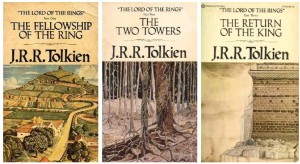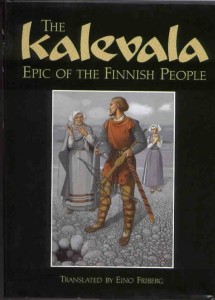LOTR: much more than a novel

It’s actually a bit like being given a kit of Lego. Sure you can use that Lego to make the giant space cruiser that’s plastered on the front of the box.
But you can also use it to make innumerable other things.
Did you use the Angerthas to transliterate the runes on Balin’s tomb? Did you try to do the same for the Ring verse? Did you start pulling the genealogies to pieces just because you could?
Exploration and speculation, to my mind, is a vital part of the continuing attraction of Middle-earth. And what the LOTR appendices do is open a window that allows you to explore entire cultures, languages and histories, often without reference to the events of the Lord of the Rings. And I haven’t even begun to touch on the contents of posthumously published works such as Unfinished Tales, The Silmarillion, Children of Hurin and the History of Middle-earth.
By comparison, RR Martin’s very extensive family trees at the back of his A Song of Ice and Fire novels exist to help readers follow the plot, and keep track of who’s who.
Indisputably, Tolkien defined the art of creating the secondary world with such ridiculous verisimilitude that authors ever since have either been reduced to trying to emulate him, or to breaking away from his example.
Previously, authors such as William Morris (The Well at the World’s End) and Lord Dunsany (The King of Elfhand’s Daughter) had toyed with the concept of the secondary world — a consistent, self-contained fictional setting for a fantasy story.
Tolkien took that concept and, through his own “what if?” sense of curiosity, his deep knowledge of languages and European myth, and a particular desire to create a “true” mythological history for England, managed to embody it in a way that no-one has rivalled ever since.
What would it take to rival Tolkien in fantasy?
 Thus, I would argue, to deserve such a comparison, any author must accomplish something similarly ground-breaking in the field.
Thus, I would argue, to deserve such a comparison, any author must accomplish something similarly ground-breaking in the field.
But we’ve already established that RR Martin’s world-building doesn’t nearly match Tolkien’s. Nor is he (to my knowledge) building a national epic in the same fashion that Tolkien attempted, and which Elias Lönnrot accomplished with the Kalevala.
So we must look to other elements.
What about RR Martin’s political focus? Creating doorstopper-sized, multi-book fantasy epics that are driven by intensely Machiavellian politics has been done before, and done exceedingly well. (Janny Wurts, Melanie Rawn)
What about anti-heroes who exhibit a dubious morality? Some of the pillars of fantasy deconstructed Tolkien in this way decades ago, in the process creating compelling protagonists who, at the far end of the scale, are almost entirely despicable. (Michael Moorcock, Stephen R Donaldson, Roger Zelazny, Gene Wolfe)
Like I said, that’s not to say that I dislike A Song of Ice and Fire. It’s more that I believe the American Tolkien label is overblown, and off the mark. Because, entertaining as it is, as grand as it is, I’m not convinced that A Song of Ice and Fire truly breaks new ground for the genre.


